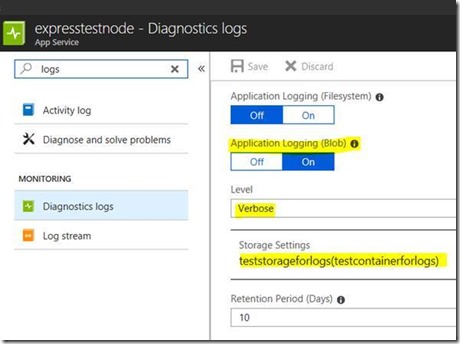Configuring node.js application on Azure App Service with Azure Blob Storage
In this article, we will learn about configuring the node js applications deployed on Azure App Services with the Azure blob storage.
If you would like to store the application logs in a blob storage on azure for the node.js applications, you would need to follow the steps below. It basically includes 2 main steps:
- Enabling from Portal
- Configuring from the code
Enabling from Portal
· Navigate to your webapp from the azure portal
· Choose the Diagnostic Logs blade. For application level logging, choose Blob storage as shown below . If you would like to choose file system, please check out the blog post here
Configuring from the code
- In your application, install the packages winston & winston-azure-blob-transport by the running the commands below
npm install winston
npm install winston-azure-blob-transport
- Now, use the code below in order to configure them from the application
|
- test.log in the above code snippet is the name of the blob where the logs get stored.
- You would be able to get the Account name, Account key and the container name from the Azure storage account view
- You would need to make use of Storage Explorer in order to check the log file as shown below.

